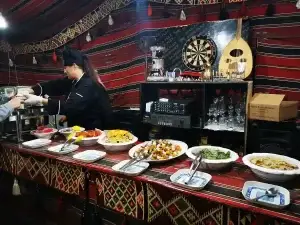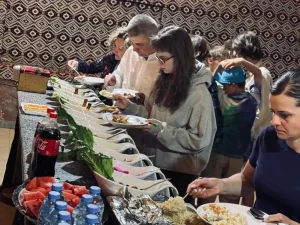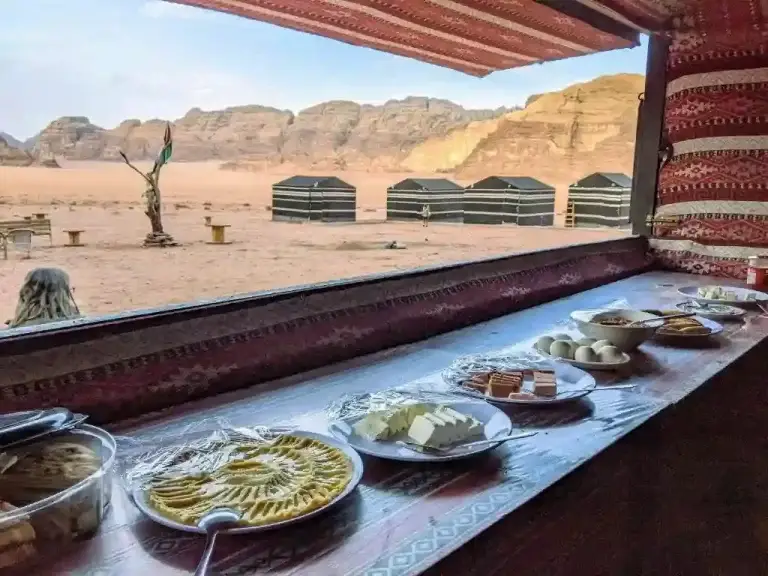Answers You May Need
Making a Reservation
How can I book a tour?
If you already know which tour you’d like, please use the Book Now form on our website.
For general questions, you can use the Enquiries form instead.
You’re also welcome to contact us directly:
Email: info@wadirumclassictours.com
WhatsApp/Phone: +962772947939
We prefer email or website forms when possible. They help keep communication clear and organized.
Please note: mobile signal in the desert is sometimes limited, especially in the evenings — it’s best to call in the morning or before 4:00 PM.
Time Zone: GMT+3 in summer, GMT+2 in winter (with daylight saving)
Payments & Cancellations
Do I need to pay a deposit?
No deposit is required to confirm your booking.
What if I need to cancel?
There’s no cancellation fee, even at the last minute. We understand that plans can change, and we trust our guests.
After booking, you’ll receive a confirmation email with:
Tour name
Dates
Price
Meeting point details
Please review your confirmation carefully and let us know if anything needs to be corrected.
How to Pay
Payment is made in cash (Jordanian Dinar) at the end of your tour
With prior agreement, we may also accept Euros or USD
Important Notes:
There are no ATMs in Wadi Rum village
We do not accept credit cards or Visa payments
Food: What Will I Be Eating?
During your stay with Wadi Rum Calm, you’ll enjoy traditional Bedouin meals prepared with care by your guide or camp hosts. The food is simple, nourishing, and full of flavor—just right for life in the desert.
Breakfast
A typical morning meal may include:
Bread with olive oil and zaatar (a flavorful herbal mix that’s good for digestion)
Assorted jams
Halawa (a sweet made from sesame)
Eggs
Cheese
And always, plenty of Bedouin tea
Lunch
Most tours include a freshly cooked lunch prepared over an open fire by your guide. This is often a light vegetarian Bedouin meal made with tomatoes and beans, possibly served with:
Tinned tuna
Fresh salad
Yogurt
Hummus or similar dips
For tours like the Full-Day Camel Trek or Pure Hiking Tour, lunch is packed and carried with you—either as a picnic or a simple boxed meal, since cooking gear isn’t practical on foot or by camel.
Dinner
Evenings at the camp include a warm, traditional Bedouin dinner. You might enjoy:
Zarb
A Bedouin barbecue cooked underground in a sand oven. It usually includes chicken, rice, roasted vegetables, salads, and fresh bread.
Mansaf
A classic Jordanian dish with chicken in a tangy yogurt sauce, served with rice, salads, a vegetarian dish, and bread.
We’re happy to accommodate dietary preferences where possible.
If you have allergies or specific requests, please let us know in advance so we can plan accordingly.




What to Bring
Here’s a recommended packing list to help you prepare for your trip to Wadi Rum Calm. These suggestions are based on the local climate, activities, and the cultural setting, so you can feel comfortable, respectful, and well-equipped during your stay.
Essentials
Sun cream
Hat and sunglasses
Towel
Flashlight or headlamp
Basic first aid kit (especially useful for hikers — for blisters, scrapes, or minor sprains)
Please note: we provide warm blankets, but not sheets or pillowcases. Bringing your own is optional, but may help you sleep more comfortably.
Clothing by Season
Winter (November – February)
Nights can be very cold and days cool, with occasional rain or wind.
Pack:
Warm sleepwear and layers
Jacket, hat, and gloves
Thick trousers and socks
A beanie or head covering for the night (helpful even inside tents)
This is especially important if you’re traveling with young children.
Spring & Autumn (March – April, September – October)
Weather can shift from warm days to cool nights.
Pack:
Light clothing for daytime
A warm jumper or jacket for evenings
Long trousers and warm socks for night
Summer (May – August)
Expect hot days and warm, comfortable nights.
Pack:
Light, breathable clothing
Sun protection (hat, sunscreen, loose long sleeves)
Cultural Clothing Tips
Wadi Rum is a traditional Bedouin area. All guests are welcome, but we encourage modest clothing—especially in the village area.
Avoid shorts or revealing clothes
Long sleeves and trousers are recommended
Female travelers may feel more at ease dressing modestly to avoid unwanted attention
Respect for local customs goes beyond clothing—kindness and awareness are always appreciated.
For Hikers
Supportive, light hiking shoes with good grip
Long sleeves and trousers for sun and scratch protection
Clothes you’re okay with getting dusty
Luggage Handling
Camel treks: your luggage will be transferred by Jeep to and from the camp
Jeep tours: you can bring your bags with you
We’re also happy to store any extra bags for you—either at the camp or safely in the village
There’s no charge for handling or storing luggage.